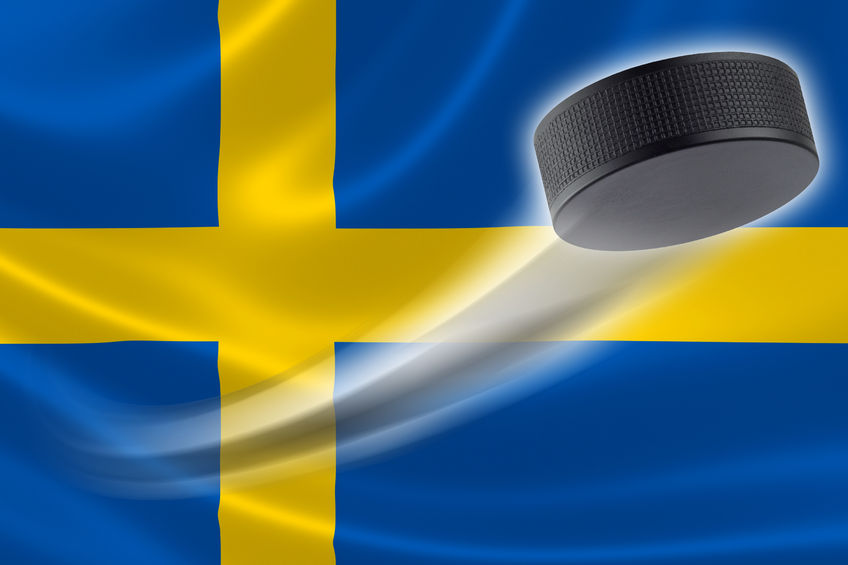Team Sweden won their 2nd consecutive gold in the IIHF 2018 Hockey World Championship in Denmark. As in the IIHF 2017, the final game was decided by a shootout. Then, Sweden’s national team “Three Crowns” defeated Team Canada. This year, Switzerland was the opponent.
The road to the finals
The 2018 edition of the Three Crowns was characterized by two features a) 20 players from the national hockey league (NHL), b) an average age of only 24 years. The team got the best possible start of the group stage by defeating Belarus 5-0. Game number two, against Czech Republic, was tougher, but Sweden managed to grab the odd goal 3-2 win. France was defeated 4-0 in an unusual dirty game. The game against Austria became a feast among the crowd as well as on the ice (7-0). The fifth game, against Slovakia, was tighter and Sweden managed to score the decider, 4-3, in overtime. The upcoming opponent in the final, Switzerland, was outmaneuvered with relative easy, in a 5-3 victory. The last game, against Russia, was a group final where the winner would face Latvia and the loser Canada. The Three Crowns managed to come back and turn 0-1 to 3-1. Russia later lost the quarterfinal against Canada in overtime.
In the playoffs, the quarterfinal against Latvia Sweden showed a somewhat crampy performance, where Latvia played an effective defense, and deadly counterattacks. Finally, Sweden managed to win 3-2. In the semifinal, Team USA led by Chicago Blackhawks superstar Patrick Kane was waiting. USA eliminated Czech Republic in the quarterfinal. The last time USA won a world championship was in 1960(!). They were the best team in the first period of the semifinal, but somehow Sweden managed to get away with a 1-0 lead after 20 minutes. In the second period, USA got a 4 minute powerplay only to see Magnus Pääjärvi score 2-0. USA never recovered after this. After an idiot move by Johnny Gaudreau, using his stick as a baseball bat, Sweden scored in their powerplay. Then, another quick goal came from nowhere, and Sweden was suddenly up by 4 after 40 minutes of play. The final period was basically just about playing on the result for the Three Crowns, and the final score was written to 6-0. USA won the bronze game against Canada later (4-1).
On the other side of the playoff tree, a disciplined Switzerland first eliminated group winners Finland 3-2, and then Canada with the same figures.
Sweden won the final against Switzerland
The final game between Sweden and Switzerland was a replay of the 2013 final, when Sweden won on home ice (first team to do that since the Soviet Union gold in 1986), defeating Switzerland 5-1. Like then, Switzerland got the 1-0 lead. Sweden got the quick equalized and the score was 1-1 after 20 minutes of play. Switzerland got the 2-1 lead in the second period. Then, Sweden put the pedal to the metal and spent over three minutes in the offensive zone. 2-2 came in the powerplay.In the third period, both teams had their chances to score the decider. Sweden could not convert on a couple of breakaways.
The overtime was characterized by careful 4 vs 4 play, where no team wanted to make any mistake. This game was to be decided by a shootout. At stake was Switzerland’s first world championship gold ever, or Sweden’s 11th. The Swiss scored at their first penalty shot, while Sweden missed. However, after two goals by Oliver Ekman-Larsson (who also scored in the shootout against Canada in 2017) and Filip Forsberg, Sweden won the shootout with two goals to one. The victory gave Sweden and Three Crowns their 2nd consecutive world championship win, just like they did with their young team in 1991 + 1992. One has to feel sorry for Switzerland who manage to pull off their game plan with precision and was as close to a gold medal as a team can come.
The Swedish gold was a result of hard work of coach Rikard Grönborg and his staff. They have managed to raise the professionalism in the Three Crowns a few notches, and make the world championship an attractive tournament and end of season for the NHL players that are eliminated in the North American Stanley Cup playoffs. The players enjoy the idea of youthful entusiasm and classic, Sweden defensive plays. This is the New Sweden!


